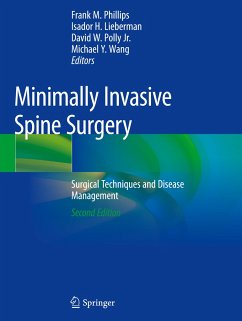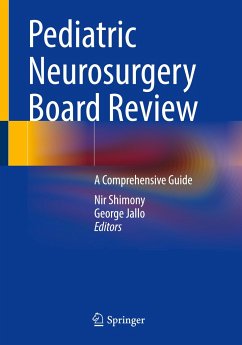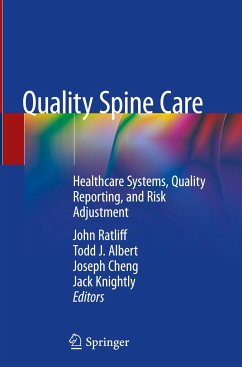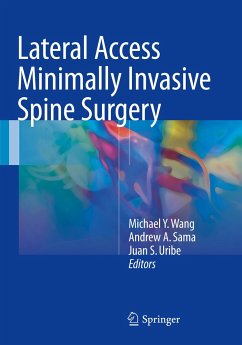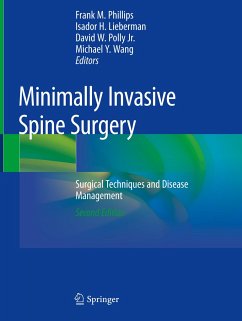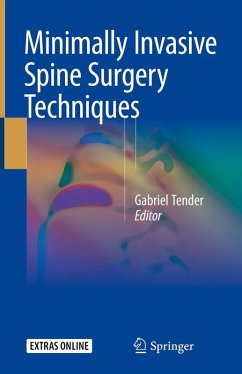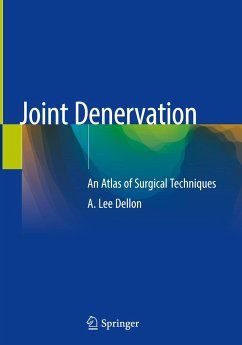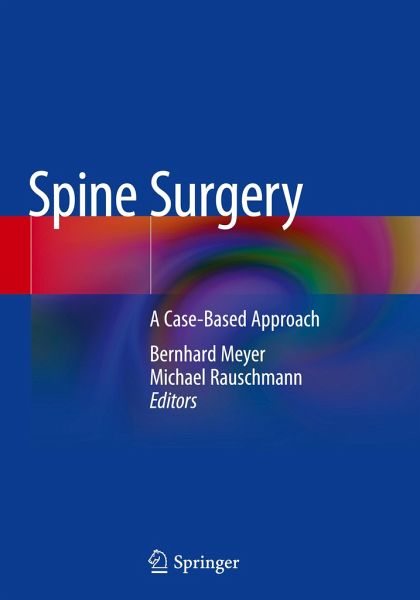
Gebundenes Buch
Spine Surgery
A Case-Based Approach
Herausgegeben: Meyer, Bernhard; Rauschmann, Michael

PAYBACK Punkte
84 °P sammeln!





This book covers the content of European postgraduate spine surgery courses, using a case-based approach. It describes a stepwise solution to a real-world clinical problem and compares this with the best available evidence. It then provides suggestions on how to bridge the gap (if there is one) between standard of care and evidence-based medicine.
Spine Surgery: A Case-Based Approach is aimed at postgraduate students of spine surgery (both trainee neurosurgeons and trainee orthopedic surgeons), and is also of interest to medical students.
Spine Surgery: A Case-Based Approach is aimed at postgraduate students of spine surgery (both trainee neurosurgeons and trainee orthopedic surgeons), and is also of interest to medical students.
Bernhard Meyer was born in Augsburg, Germany in 1962. He spent two years at the University of Padova Medical School, Italy before completing his medical degree at the University of Erlangen, Germany in 1989. During this time he completed a sub-internship at Northwestern University, Chicago and SUNY at Brooklyn, NY, USA. He completed his neurosurgery internship and residency in Germany at the University of Tübingen and City Hospital of Duisburg, respectively. He was then a visiting neurosurgery resident at the University of Zürich, Switzerland and Barrow Neurological Institute, Phoenix, AZ, USA. He received Board Certification as a Neurosurgeon from the Regional Chamber of Physicians of Northrhine-Westfalia, Düsseldorf Germany in 1995. Since then, he has worked at the University of Bonn and then the Technical University of Munich, where he is now a Full Professor. He is Chairman of the Spine Section of EANS, Past-President of the German Academy of Neurosurgery and President of the International Group for the Advancement of Spinal Surgery. He will be President of the German Spine Society in 2019. Michael Rauschmann was born in Frankfurt am Main, Germany in 1963. He is currently Head of the Department of Spine and Reconstructive Surgery at the Spinal Orthopedics and Reconstructive Orthopedics Clinic, Offenbach am Main, Germany. He studied medicine at Johann Wolfgang Goethe University from 1986-1992, having previously completed military service and trained as a car mechanic. He trained in trauma and general surgery in Durban, South Africa, and at the Nordwest Hospital in Frankfurt. He became a specialist in orthopedics in 1998, a specialist in orthopedics and trauma surgery in 2007, and in 1992 he completed his doctor of medicine with the dissertation 'Morphology of the head at the spotted Dolphin Stenella attenuata with special consideration of the cranial nerves. Macroscopic preparation and modern imaging techniques.' In 2005 he completed his postdoctoral qualification with the thesis 'Hydroxyapatite/calcium sulphate form body as absorbable carrier individual local antibiotic therapy of acute and chronic bone infections'. Since 2000 he has worked as a consultant and was Head of the Department of Spine Surgery from 2006 until 2017. He became a Professor in 2010 and President of German Spine Society in 2015. He has published several German-language books on spine surgery.
Produktdetails
- Verlag: Springer / Springer International Publishing / Springer, Berlin
- Artikelnr. des Verlages: 978-3-319-98874-0
- Seitenzahl: 728
- Erscheinungstermin: 20. März 2019
- Englisch
- Abmessung: 260mm x 183mm x 42mm
- Gewicht: 1635g
- ISBN-13: 9783319988740
- ISBN-10: 3319988743
- Artikelnr.: 53160311
Herstellerkennzeichnung
Springer-Verlag GmbH
Tiergartenstr. 17
69121 Heidelberg
ProductSafety@springernature.com
"The book is written for trainees, but it serves well as a reference for seasoned attendings looking for in-depth knowledge of a certain topic. It certainly meets and exceeds the expectations for the intended audience. ... This is a high-quality publication that deserves a spot on everyone's bookshelf. It is very useful to trainees who wish to understand the decision-making process and algorithms for most spinal pathology." (Cristian Gragnaniello, Doody's Book Reviews, August 02, 2019)
Für dieses Produkt wurde noch keine Bewertung abgegeben. Wir würden uns sehr freuen, wenn du die erste Bewertung schreibst!
Eine Bewertung schreiben
Eine Bewertung schreiben
Andere Kunden interessierten sich für


